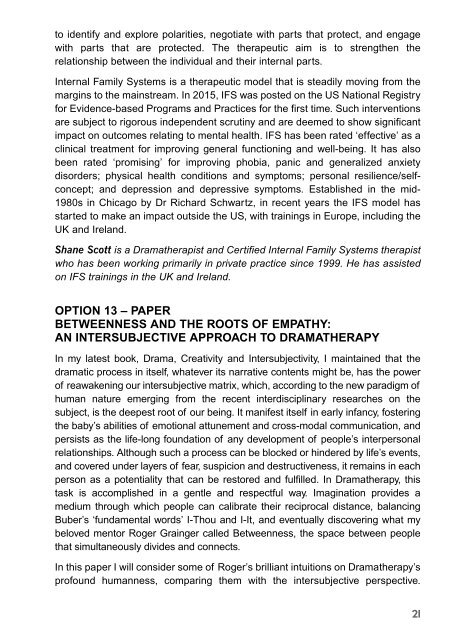On the Edge
dramatherapy_conference_2016_online_form
dramatherapy_conference_2016_online_form
You also want an ePaper? Increase the reach of your titles
YUMPU automatically turns print PDFs into web optimized ePapers that Google loves.
to identify and explore polarities, negotiate with parts that protect, and engage<br />
with parts that are protected. The <strong>the</strong>rapeutic aim is to streng<strong>the</strong>n <strong>the</strong><br />
relationship between <strong>the</strong> individual and <strong>the</strong>ir internal parts.<br />
Internal Family Systems is a <strong>the</strong>rapeutic model that is steadily moving from <strong>the</strong><br />
margins to <strong>the</strong> mainstream. In 2015, IFS was posted on <strong>the</strong> US National Registry<br />
for Evidence-based Programs and Practices for <strong>the</strong> first time. Such interventions<br />
are subject to rigorous independent scrutiny and are deemed to show significant<br />
impact on outcomes relating to mental health. IFS has been rated ‘effective’ as a<br />
clinical treatment for improving general functioning and well-being. It has also<br />
been rated ‘promising’ for improving phobia, panic and generalized anxiety<br />
disorders; physical health conditions and symptoms; personal resilience/selfconcept;<br />
and depression and depressive symptoms. Established in <strong>the</strong> mid-<br />
1980s in Chicago by Dr Richard Schwartz, in recent years <strong>the</strong> IFS model has<br />
started to make an impact outside <strong>the</strong> US, with trainings in Europe, including <strong>the</strong><br />
UK and Ireland.<br />
Shane Scott is a Drama<strong>the</strong>rapist and Certified Internal Family Systems <strong>the</strong>rapist<br />
who has been working primarily in private practice since 1999. He has assisted<br />
on IFS trainings in <strong>the</strong> UK and Ireland.<br />
OPTION 13 – PAPER<br />
BETWEENNESS AND THE ROOTS OF EMPATHY:<br />
AN INTERSUBJECTIVE APPROACH TO DRAMATHERAPY<br />
In my latest book, Drama, Creativity and Intersubjectivity, I maintained that <strong>the</strong><br />
dramatic process in itself, whatever its narrative contents might be, has <strong>the</strong> power<br />
of reawakening our intersubjective matrix, which, according to <strong>the</strong> new paradigm of<br />
human nature emerging from <strong>the</strong> recent interdisciplinary researches on <strong>the</strong><br />
subject, is <strong>the</strong> deepest root of our being. It manifest itself in early infancy, fostering<br />
<strong>the</strong> baby’s abilities of emotional attunement and cross-modal communication, and<br />
persists as <strong>the</strong> life-long foundation of any development of people’s interpersonal<br />
relationships. Although such a process can be blocked or hindered by life’s events,<br />
and covered under layers of fear, suspicion and destructiveness, it remains in each<br />
person as a potentiality that can be restored and fulfilled. In Drama<strong>the</strong>rapy, this<br />
task is accomplished in a gentle and respectful way. Imagination provides a<br />
medium through which people can calibrate <strong>the</strong>ir reciprocal distance, balancing<br />
Buber’s ‘fundamental words’ I-Thou and I-It, and eventually discovering what my<br />
beloved mentor Roger Grainger called Betweenness, <strong>the</strong> space between people<br />
that simultaneously divides and connects.<br />
In this paper I will consider some of Roger’s brilliant intuitions on Drama<strong>the</strong>rapy’s<br />
profound humanness, comparing <strong>the</strong>m with <strong>the</strong> intersubjective perspective.<br />
21


